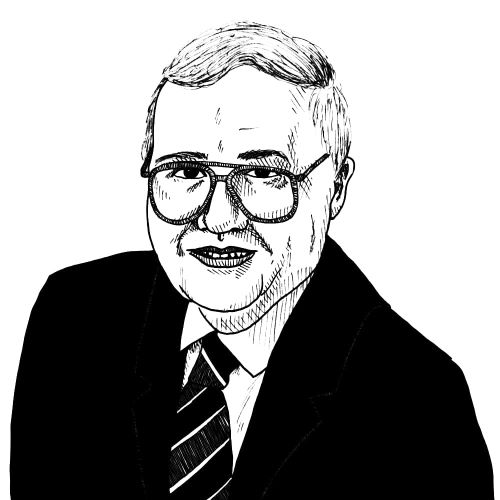Liberty Matters
The Unique Gordon Tullock

I visited the Institute of Economic Affairs (IEA) this past Monday. A few years ago Liberty Matters hosted a discussion on Arthur Seldon and the IEA to which I contributed. On that occasion I told of how Tullock would ask students, "Why is there no U.S. IEA?"
The answer to that question turns on the uniqueness of Arthur Seldon and the publication program he directed. Seldon translated the theoretical innovations of economists from the London School of Economics, such as those of Cannan, Robbins, Hayek, and Plant, and bridged the gap between theory and practice in contemporary policy disputes. Seldon also sought to engage the public with the latest developments in economic thinking in the United States, 1950s-1990s, by making the analysis accessible to the intelligent layman. Better than others in the emerging "think tank" world, Seldon knew Bastiat's dictum that the worst thing for a good cause is not to be artfully criticized but to be ineptly defended. The IEA under Seldon's tight editorial policy demanded high-quality arguments and careful, detailed empirical analysis. The stakes were too high to be sloppy in the economics for the everyman.
But Seldon isn't our story today. As I sat in the IEA and looked at portraits of the Nobel Prize-winning economists it has published, I was sadly reminded that Gordon Tullock's portrait wasn't on display. But Tullock contributed mightily to the IEA, especially his works The Vote Motive and Government: Whose Obedient Servant? These works, as well as his articles in Economic Affairs and his lectures at the IEA, did much to introduce and spread the "economics of politics" throughout British intellectual culture.
I'd like us to flip Tullock's question and relate it to him. Why is there no Gordon Tullock today in the economics profession? First consider the precarious position he himself held — no PhD, only a JD, and no real formal training in economics. He possessed a quick and nimble mind but lacked the social graces to charm those in positions of academic privilege. Yet through publication and originality of thought, Tullock made himself a career in economics, law, and political science. Who is this generation's equivalent of Gordon Tullock?
The economics profession has become increasingly professionalized and increasingly obsessed with measuring scientific impact at the departmental and individual level. Last year at the American Economic Association meetings, a panel of Nobel laureates discussed the problem of mind-numbing conformity within the profession due to the stranglehold of the top five departments and the top four journals. There is a methodological and analytical consensus and a risk-averseness among the caretakers of the profession such that creativity is squelched.
This might be overstating the problem, but the reality is that one would be hard-pressed to find a contemporary Gordon Tullock among the elite. Tullock may have existed professionally in the outskirts after his time at the University of Virginia — South Carolina, Rice, VPI, George Mason, Arizona, and back to GMU — but he wasn't on the outskirts with his published work in the Journal of Political Economy, Quarterly Journal of Economics, and American Economic Review, and with his desire to pursue unusual topics or unusual approaches. The 1970s-1990s were full of folks willing to stalk taboo subjects and challenge the conventional wisdom in economics, political science, sociology, and history. Tullock just may have been the most irreverent of them all. He sought to feed his curiosity and creativity as a scholar of human and nonhuman societies.
James Buchanan used to call on his students to "dare to be different," and as someone slightly out of sync with my professional colleagues from the start, I found this message from someone so prominent to be very inspiring. But it was more so because right next to Buchanan was the living embodiment of that call — Gordon Tullock.
Tullock was willing to ask the uncomfortable questions — what is so desirable about democracy? what is so efficient about the common law? etc. He simply studied human beings in all walks of life and in all historical circumstances, and he didn't care what others thought about him for asking. Perhaps there are some questions which shouldn't be asked in polite intellectual company, but Tullock didn't recognize them. In retrospect, we are better off because he risked social sanction, professional isolation, and a certain level of disciplinary ostracism.
I sure hope there are quirky, daring, and creative minds in the economics profession today that I am just overlooking. But I stay pretty much on top of what is going on, and it's not clear at all that within the elite of our profession there exists such bold thinking and the desire to go in the opposite direction of everyone else to tackle important puzzles (as well as solve some unimportant but interesting ones). The stakes are too high for the professional elite, so a certain level of risk-aversion sets in. And if creativity and bold thinkers are not that prevalent in our profession, perhaps we should revisit Tullock's own The Organization of Inquiry to ask ourselves what structural incentives have led us to this situation.
We need more Gordon Tullocks, not fewer, if the science of praxeology is going to progress.
References
John Blundell, "Arthur Seldon and the Institute of Economic Affairs" Liberty Matters Online Discussion Forum (November, 2013) </pages/seldon-and-the-iea>.
American Economic Association 2016 meeting panel on "Publishing and Promotion in Economics:The Curse of the Top Five" <https://www.aeaweb.org/webcasts/2017/curse.php>.
Copyright and Fair Use Statement
“Liberty Matters” is the copyright of Liberty Fund, Inc. This material is put on line to further the educational goals of Liberty Fund, Inc. These essays and responses may be quoted and otherwise used under “fair use” provisions for educational and academic purposes. To reprint these essays in course booklets requires the prior permission of Liberty Fund, Inc. Please contact oll@libertyfund.org if you have any questions.